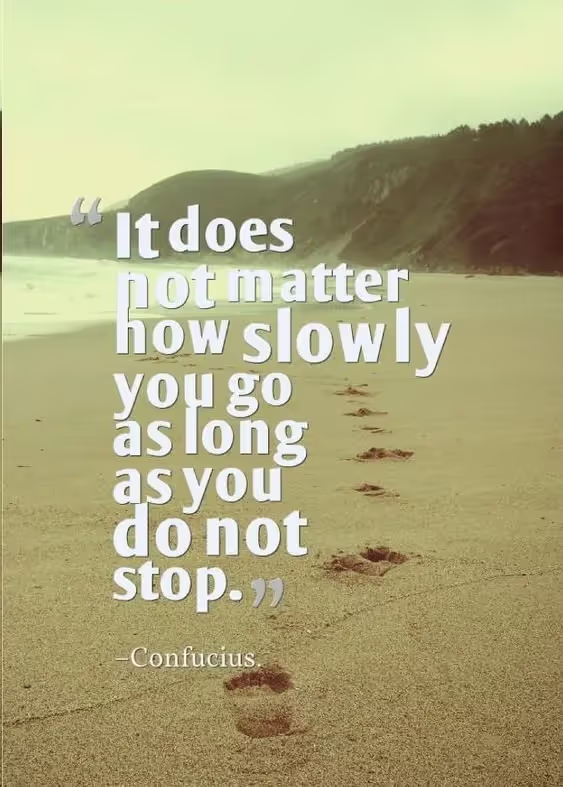At some point or other in our human existence we all experience some varying degree or intensity of the following thought process: 'whatever', 'I quit', 'I...

At some point or other in our human existence we all experience some varying degree or intensity of the following thought process: 'whatever', 'I quit', 'I give up', 'f@#$ it', 'I'm done', 'forget about it', 'screw it', 'screw this', or 'I don't care'.
We may retreat into this way of thinking when fighting, trying, or struggling to change a behavior or other aspect of our lives.
Remember that new, popular diet you tried that lasted a week? Or that bad habit (biting your nails, swearing, etc.) that you wanted to stop? What about your decision to stop drinking or using other drugs?
And let's not forget the ever-daunting New Year's Eve resolutions. When our good intentions, optimism, and efforts begin to take a nosedive, we can easily slide into a way of thinking that ultimately ends our noble pursuits.

The most dangerous thoughts, or attitudes if you will, that any human being can contemplate are such as those as listed: 'whatever', 'I quit', 'I give up', 'f@#$ it', 'I'm done', 'forget about it', 'screw it', 'screw this', or 'I don't care'. Because when you don't care………you really don't care, and this brings an end to recovery efforts or other changes we wanted to make.
It becomes easier to bury, caring about change, under the 'f@#$-its', or to retreat into the 'whatever' mentality, than to continue working towards our goal of change. Throwing up my hands in surrender to urges, cravings, frustrations or fear can mean the end of sobriety, and ultimately, I end up making decisions that hurt myself or others. In that state of mind, all of my efforts seem pointless, or all were done for nothing because restoration is a slow process and I want it to all be better now………. that's when hopelessness can settle in. When I disappoint myself, guilt/shame quickly follow and this, in turn, can drive me deeper into a state of apathy.
Therefore, learning how to prevent this destructive thought pattern is imperative for making change and living a life of recovery. Thought stopping techniques, cognitive restructuring, 'doing one thing differently', 'eating the elephant one bite at a time', and many more such recovery tools, help us to learn how to take small manageable steps for making measurable progress. We need to see and feel progress or success in order to keep pursuing changes.
We all have tried multiple times throughout our lives to make changes and more than likely we have all failed to make a change. For those struggling with addiction to alcohol and other drugs, failure is not an option. Meaning, the fear of failure prevents some from even trying to stop use despite the ongoing problems, heartbreak, and damage that alcohol and other drugs cause. If you have ever tried and failed to change anything in your life, especially more than one time, you probably have experienced hesitancy to try again. Usually, this comes from a place of 'fear of failure'.
To combat a fear of failure and thus to prevent apathy regarding making a change it is helpful to learn how to fail well. The concept of 'Fail Well' basically is the old saying, 'when you fall off the horse, get back on'. There is not a person alive who hasn't fallen off the horse called Change. Furthermore, most have fallen or failed to attempt to change the same behavior, over and over. Yes, it would be great if we could get it the first time but valuable lessons are often learned through repetitive efforts. If failure is unacceptable to you, put yourself in the shoes of an inventor. Inventing is a process of finding a thousand ways something doesn't work before landing on the way that does (I believe some famous inventor said that once). If we really knew the absolute best way to make a change, we probably were already doing it the way that works for us.
When we learn to Fail Well, we can find the lesson, learn what does and doesn't work. That does NOT make us a failure. I would caution you, however, do not go it alone. You need support, encouragement, having a noisy cheerleader by your side that will have your back no matter what. But you also need a plan, a recovery plan that brings you success with your efforts. Putting an end to the hold of alcohol and other drugs on your life is not just a matter of stopping the use. Anyone quit, it's the staying quit that is the hard part. Saturate your life and mind with things that provide you the opportunity for success. Stay in treatment and therapy until you have the tools you need for each day of your recovery. There is no 'one size fits all' in recovery, no magic pill, no cure, no willpower that is strong enough, no pseudo-legal substance that can replace what you really want.
Recovery is a total change of everything, including your thinking and behaviors. Anyone who has a problem with alcohol and other drugs can tell you that it is a no-brainer to change people, places, and things in recovery, but what often is not changed is the thinking. It is that lack of change that often leads to relapse. Learning to change the way we think is difficult at times but completely doable. Therapy can help you through the process of changing your thinking in a safe environment where there is no judgment, no recriminations with a lot of encouragement and validation. You can begin to work through and heal all of those parts of your past that have kept you in that dark place for so long.
I know, just thinking about having to go there, can cause fear, and will make you not want to even try, but what has kept you in your addiction and prevented your efforts of trying to change from succeeding are those things that often you have buried deep down inside. Addressing and resolving these issues in counseling can bring you to a place of peace that alcohol and other drugs will never give you. You can learn the tools needed to change your life so you never have to retreat back under:'whatever', 'I quit', 'I give up', 'f@#$ it', 'I'm done', 'forget about it', 'screw it', 'screw this', or 'I don't care'.
The best way to help an addict without enabling them is by setting boundaries and getting help for yourself. It is important to remember that you cannot control the addict's behavior, but you can offer support and understanding. With time and patience, you can help your loved one recover from addiction.
Treatment for alcohol abuse often includes counseling, support groups, and medication. With the right help, your spouse can recover from alcoholism and go on to lead a healthy and happy life.
Some resources for family members of addicts include therapy, counseling, 12-step programs, and other support groups. It is important to seek out these resources to get the tools you need to deal with your loved one's addiction. You can also find help for yourself through these resources.
If you think you might be struggling with alcohol abuse, the first step is to talk to your doctor. Your doctor can help you assess your drinking habits and recommend treatment options. There are also many different types of treatment programs available for alcohol abuse, so you can find one that fits your needs and circumstances. Additionally, support groups can be a valuable resource for anyone struggling with alcohol abuse. These groups provide a safe space to share your experiences and connect with others who are facing similar challenges.
Yes, alcohol abuse is a treatable condition. However, it often requires professional treatment to overcome. With the right support, though, anyone can overcome alcohol abuse and regain control of their life. It's important to reach out for help if you or someone you know is struggling. With the right treatment, anyone can overcome alcohol abuse and regain control of their life.
Some common signs of alcohol abuse include drinking more than intended, neglecting responsibilities, and continuing to drink despite negative consequences